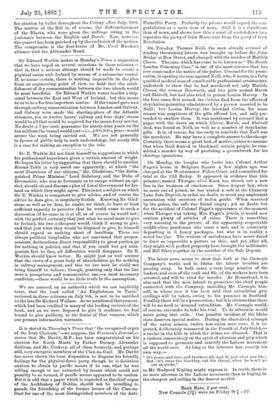Sir E. Watkin did not limit himself to suggestions to
which his professional experience gives a certain amount of weight. He began his letter by suggesting that there should be another Round-Table (a very small one apparently), at which " the most illustrious of our citizens," Mr. Gladstone, " the distin- guished Prime Minister," Lord Salisbury, and the Duke of Devonshire, who was so fortunate as to escape without an epi- thet, should sit and discuss a plan of Local Government for Ire- land on which they might agree. This is not a subject on which Sir E. Watkin is competent to give advice, and of course the advice he does give, is singularly foolish. Knowing Mr. Glad- stone so well as he does, he ought, we think, to have at least sufficient sagacity to perceive that he would come to such a discussion (if be came to it at all, as of course he would not), with the perfect certainty that just what he cared most to give to Ireland, his two colleagues would think it wrong to give, and that just what they would be disposed to give, he himself should regard as nothing short of insulting. There are always political busybodies who are convinced that prepos- sessions, declarations, direct responsibility to great parties, go for nothing in politics, and that if you could but get anta- gonists face to face, all difficulties would disappear. Sir E. Watkin should know better. He might just as well assume that the views of a great body of shareholders go for nothing in railway management, and this we are sure he could not bring himself to believe ; though, granting only that the line were a prosperous and remunerative one,—a most necessary condition,—there would be no little truth in the assumption.


































 Previous page
Previous page